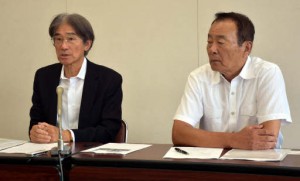51 A-bomb survivors living in North Korea have died over the past 10 years
Jul. 27, 2018
by Kyosuke Mizukawa, Staff Writer
On July 26, the support and liaison conference for Atomic-bombed survivors living in North Korea, which is co-organized by the Japan Congress Against A- and H-Bombs (Gensuikin) and its affiliated organizations, announced that at least 51 A-bomb survivors living in North Korea, more than ten percent of the 382 survivors who were documented as residing there in 2008, have since died. This is an interim report on a follow-up survey by the North Korean A-bomb Survivors’ Association in North Korea, and a member of the liaison conference went to North Korea and interviewed the association in the middle of July. The conference is asking the Japanese government to swiftly provide medical assistance.
Tetsuo Kaneko, the head of Gensuikin, discussed his visit to North Korea at a press conference held at Hiroshima City Hall. This past spring, the North Korean A-bomb Survivors’ Association approached him about making this visit, which took place from July 10 to 14. During that time, he met with Park Mun Suk, the vice president of the association, and other members.
According to Mr. Kaneko, in January 2018, the association initiated a follow-up survey of the 382 A-bomb survivors who were confirmed to be alive in a fact-finding survey announced in 2008. The association obtained information on 111 survivors until May and explained that 60 of them were alive. The survey is still ongoing. This is the third such survey by the association.
Moreover, the association said that many A-bomb survivors had developed circulatory diseases, leukemia, and cataracts, and requested that Japan provide support, including medical equipment and medical supplies.
Though the Atomic Bomb Survivors Relief Law stipulates financial support, including medical expenses, regardless of nationality, Japan has no diplomatic relations with North Korea, so, in reality, it is difficult for the survivors there to receive benefits. The Japanese government sent an inquiry delegation to North Korea in 2001 for the first time to consider the support for A-bomb survivors in North Korea, but there has been no significant progress in recent years.
Kim Jin Ho, the executive director of the Council of A-bombed Koreans in Hiroshima, attended the press conference and said, “Now that the leaders of North Korea and the United States have met and held talks with one another, I hope that the Japanese government will also promptly provide humanitarian assistance.”
(Originally published on July 27, 2018)
On July 26, the support and liaison conference for Atomic-bombed survivors living in North Korea, which is co-organized by the Japan Congress Against A- and H-Bombs (Gensuikin) and its affiliated organizations, announced that at least 51 A-bomb survivors living in North Korea, more than ten percent of the 382 survivors who were documented as residing there in 2008, have since died. This is an interim report on a follow-up survey by the North Korean A-bomb Survivors’ Association in North Korea, and a member of the liaison conference went to North Korea and interviewed the association in the middle of July. The conference is asking the Japanese government to swiftly provide medical assistance.
Tetsuo Kaneko, the head of Gensuikin, discussed his visit to North Korea at a press conference held at Hiroshima City Hall. This past spring, the North Korean A-bomb Survivors’ Association approached him about making this visit, which took place from July 10 to 14. During that time, he met with Park Mun Suk, the vice president of the association, and other members.
According to Mr. Kaneko, in January 2018, the association initiated a follow-up survey of the 382 A-bomb survivors who were confirmed to be alive in a fact-finding survey announced in 2008. The association obtained information on 111 survivors until May and explained that 60 of them were alive. The survey is still ongoing. This is the third such survey by the association.
Moreover, the association said that many A-bomb survivors had developed circulatory diseases, leukemia, and cataracts, and requested that Japan provide support, including medical equipment and medical supplies.
Though the Atomic Bomb Survivors Relief Law stipulates financial support, including medical expenses, regardless of nationality, Japan has no diplomatic relations with North Korea, so, in reality, it is difficult for the survivors there to receive benefits. The Japanese government sent an inquiry delegation to North Korea in 2001 for the first time to consider the support for A-bomb survivors in North Korea, but there has been no significant progress in recent years.
Kim Jin Ho, the executive director of the Council of A-bombed Koreans in Hiroshima, attended the press conference and said, “Now that the leaders of North Korea and the United States have met and held talks with one another, I hope that the Japanese government will also promptly provide humanitarian assistance.”
(Originally published on July 27, 2018)








